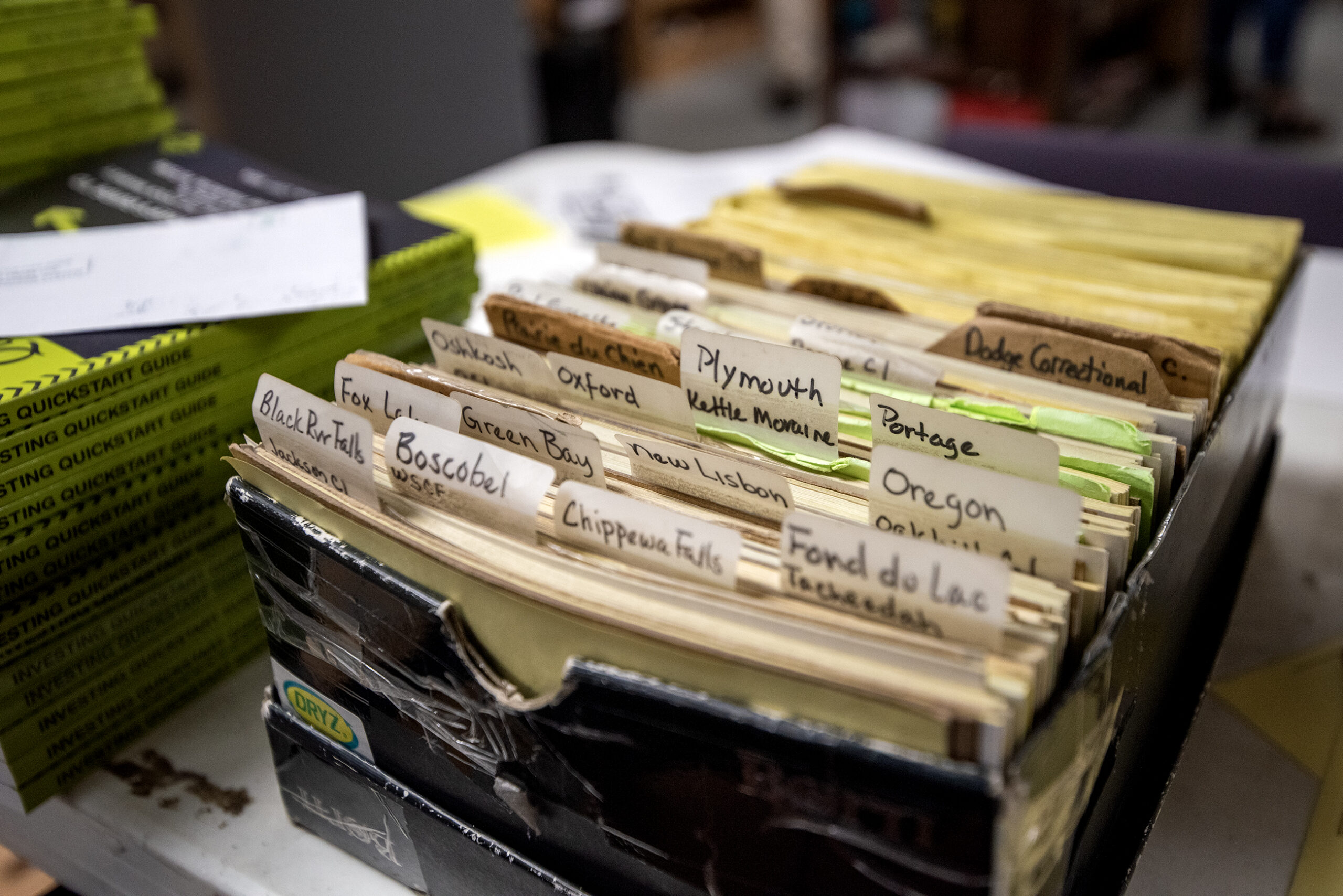Hundreds of book and magazine titles, tackling subjects ranging from erotica to computer literacy, are banned inside Wisconsin prisons.
That includes books flagged as security threats, like “Advanced Gunsmithing” or “Krav Maga: Fundamental Strategies,” which refers to the Israeli martial art.
But the rules are also far-reaching enough to ban access to books that relate to fantasy role-playing games, like Magic the Gathering or Dungeons and Dragons.
News with a little more humanity
WPR’s “Wisconsin Today” newsletter keeps you connected to the state you love without feeling overwhelmed. No paywall. No agenda. No corporate filter.
And some formerly incarcerated people say restrictions on books made it harder to prepare for life after prison.
For Marianne Oleson, the restrictions seemed counterproductive. While serving time, Oleson tried to stay to current in her career field by seeking out books on web design and Search Engine Optimization. But Oleson said she had to abandon those efforts when her requests for those books were denied.
Oleson, who now advocates against mass imprisonment through a group called EX-incarcerated People Organizing of Wisconsin, or EXPO Wisconsin, says those limitations seemed at odds with the stated purpose of her incarceration.
“My incarceration was to help me understand not only why I made the poor choice that I made, but to learn a better way, and in my mind, that meant a strong vocation,” said Oleson who was sentenced in 2012 for selling fake Facebook stock. “So it was startling to me that opportunities to further my education to expand my knowledge would be blocked.”
State prison officials screen reading materials, including those sent to inmates via mail, and the Wisconsin Department of Corrections keeps a list of publications that have been “reviewed” after concerns. Wisconsin Public Radio obtained that list of reviewed publications in response to a 2022 public records request to the DOC.
Wisconsin prisons prohibit some books on coding, tech literacy, calling them a threat to security
DOC policy bans any reading materials that jeopardize the “safety, treatment or rehabilitative goals of an inmate” or that’s deemed to be a “threat to institutional security and order.”
And the department has used the prospect of a threat to security to deny access to certain instructional books — especially those that relate to technology. That includes a book called “Windows 10 in Easy Steps” and multiple books on computer coding, like the second edition of “Confident Coding: How to write Code and Futureproof Your Career.”
But, Oleson, who says she drove a prison van that transported other female prisoners to their jobs during one point in her incarceration, questioned whether many of the banned books truly presented a threat to security.
“Here I am being handed keys to a vehicle and allowed to leave every day and yet a book that would teach me how to use Microsoft FrontPage was a security risk,” Oleson said. “I found that confusing.”
Books related to coding or electronics could still be allowed if an inmate orders them as a part of a course they’re enrolled in, according to Department of Corrections spokesman John Beard.
“This Administration has worked with higher education partners across the state to expand job training in high-demand fields, like mechatronics, computer numeric controls and welding, to name a few,” Beard wrote in an email, noting that DOC officials have worked with the University of Wisconsin System to expand the “Odyssey Behind Bars” program, which offers both non-credit and for-credit courses to people in prison.
“We’ve gone from having one institution-based Job Center in 2018, to 11 Job Centers that can help people get a head start on their resume building and job search before returning to the community,” Beard added.
Anti-censorship advocate: Book bans can ‘snowball’ beyond true threats to security
But Moira Marquis, who leads a prison writing program for the anti-censorship advocacy group PEN America, says it’s a “pretty far-fetched paranoid fantasy” to believe that a book like “Windows 10 in Easy Steps” could present a threat to security by teaching people to somehow “develop into computer hackers and hack the computerized systems of security at the facilities.”
Marquis believes the rationale of needing to protect security, can “snowball” into banning a wide range of books that people in power consider subversive. She gave the example of Toni Morrison’s “The Bluest Eye.” That novel, which deals with racism and childhood sexual abuse, has been banned in Kansas prisons.
“It’s, I think, unlikely that security is really being served by limiting what people can read,” Marquis said. “Prison is seen as legitimately denying one civil right, like your freedom of liberty. But when we deny one civil right, you have opened up the door to deny all of them. And that’s a really foundational conceptual question for a culture to grapple with: Is this the right way to deal with social transgressions?”
In Wisconsin, prison officials denied access to scores of books and magazines because they contained nudity or otherwise violated a DOC policy banning “pornography,” the list obtained by WPR shows. Per its policy, the prison system also bars publications that teach or advocate breaking the law or any prison rules, as well as any materials that advocate “violence or hatred” or describe how to make weapons, explosives or drugs.
For instance, a book called “High Times: A 40-Year History of the World’s Most Infamous Magazine,” is banned because it glorifies marijuana use, a prison official wrote. And in 2019, issues of USA Today Sports Weekly were given the no-go because an official determined they could have been used to “facilitate gambling with fantasy statistics.”
Court records: Wisconsin prison claimed Dungeons and Dragons could promote gang activity, escapism
The restrictions also extend into the realm of fantasy.
A prison policy specifically bans any materials related to fantasy role play games, like Magic the Gathering or Dungeons and Dragons. That’s led to bans on books like “Magic The Gathering Official Encyclopedia.” Another volume called the “The Art of Magic: The Gathering” was banned because it was listed as a security threat, according to the list obtained by WPR.
“Historically, fantasy role playing games have been denied as they can create a rank structure amongst those who play, which is prohibited,” Beard, the DOC spokesman, wrote in an email.
More than a decade ago, battles with fictional dragons and wizards turned into a battle in federal courts.
A Wisconsin inmate and avid Dungeons and Dragons fan named Kevin Singer sued the Waupun Correctional Institution after a security supervisor there said he got an anonymous letter from an inmate, claiming Singer and others were forming a D&D “gang,” court records show. Officials searched Singer’s cell in 2004 and confiscated 21 books and 14 magazines related to D&D. They also took a 96-page instructional manual that Singer had handwritten himself, describing imaginary worlds called “campaign settings” where D&D gameplay can take place.
Singer argued prison officials had violated his free speech, equal protection and due process rights, but the prison’s security supervisor submitted an affidavit saying co-operative games like D&D mimic the structure of a gang. That prison official compared a D&D “dungeon master,” someone who gives instructions to other players, to the leader of a gang. He also claimed fantastical games like D&D could “foster an inmate’s obsession with escaping from the real life, correctional environment” and thereby create a security threat, court records show.
A federal court ended up dismissing Singer’s suit, and in 2010 that dismissal was upheld upon appeal. Singer, who’s currently serving a life sentence for homicide, could not be reached for comment.

Wisconsin volunteers say books are a lifeline to people behind bars
Books, whether escapist or practical, are a lifeline to people behind bars, said John Peck, a volunteer with Wisconsin Books to Prisoners.
“Access to books is sort of considered a privilege in the prisons,” Peck said. “Reading is a human right. People should have access to education as a way to better themselves and learn about the world and improve their skills.”
Wisconsin Books to Prisoners, a nonprofit affiliated with the Madison-based book store called A Room of One’s Own, has sent more than 60,000 books to people behind bars since 2006. Those books are mailed in response to letters from incarcerated people who ask for specific titles or topics. The most common requests include dictionaries and books on trade and job skills, said volunteer Camy Matthay.
Wisconsin Books to Prisoners has received denial letters because the free books it sent were deemed to be prohibited, although Matthay said that happens rarely.

After being released from Wisconsin prison in 2022, Dant’e Cottingham says he immediately sought out books and YouTube videos that he couldn’t access while in prison.
“You get to a point where you have to take responsibility for your own education and I reached that point,” Cottingham said of his time behind bars.
“And I looked around and there was a lot of books and stuff that you couldn’t have,” Cottingham said. “At a time where I was in a position where I wanted to expand. I was curious. I wanted to know things.”
Cottingham, who’s now a criminal justice reform advocate through EXPO Wisconsin, sees restrictions on books within prisons as a symptom of a broader problem.
“The intent of incarceration in this state is to break you, break your spirit, break you intellectually, break you emotionally for the purpose of control and agitation,” he said. “Books counter that, is the opposite of that. … It empowers you.”
Explore the list: Which books, magazines are banned inside Wisconsin prisons?
Wisconsin Public Radio used a public records request to obtain a list of publications that were reviewed by Wisconsin’s Department of Corrections. Click here to open a spreadsheet and explore that list, which appears as submitted by the department in response to the request.
The list was last updated at the end of September 2022, and indicates whether each publication was approved or denied by a prison official. You can also click on tabs to explore publications reviewed in earlier years, as far back as 2006.
Wisconsin Public Radio, © Copyright 2025, Board of Regents of the University of Wisconsin System and Wisconsin Educational Communications Board.





